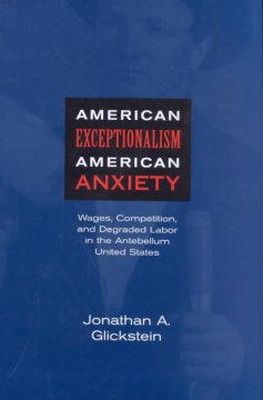
Stock image for illustration purposes only - book cover, edition or condition may vary.
American Exceptionalism, American Anxiety: Wages, Competition and Degraded Labor in the Antebellum United States
Jonathan A. Glickstein
€ 86.49
FREE Delivery in Ireland
Description for American Exceptionalism, American Anxiety: Wages, Competition and Degraded Labor in the Antebellum United States
Hardcover. An examination of the supposed role of poverty, the fear of poverty and other negative work incentives in the era of early industrial capitalism and escalating sectional conflict over slavery. This text examines a wide spectrum of antebellum American thought on these and related issues. Num Pages: 384 pages, index. BIC Classification: 1KBB; HBJK; KCF; KCZ. Category: (G) General (US: Trade). Dimension: 235 x 156 x 33. Weight in Grams: 748.
The mythology of nineteenth-century American economic exceptionalism trumpeted the positive work incentives prevailing in a society of scarce labor, weak class barriers, and abundant opportunity. This ideology agreed with the optimistic vein of political economy, in which high wages went hand in hand with increased productivity. What, then, was the supposed role of poverty, the fear of poverty, and other ""negative"" work incentives in the era of early industrial capitalism and escalating sectional conflict over slavery? American Exceptionalism, American Anxiety examines a wide spectrum of antebellum American thought on these and related issues, including slavery and cheap immigrant and female sweated labor. Some leading American critics of slavery and ""indiscriminate"" poor relief suggested that ""free market"" compulsions of hunger and thirst were therapeutic and ennobling and by themselves elevated capitalist wage labor above chattel servitude. Others, including prominent Republican proponents of the mythology of northern American exceptionalism, tied the legitimacy of capitalist wage labor to the hireling's ability to commodify his labor to his own advantage. Distinct from both these groups were labor-reform critics who insisted both that capitalists were finding ""starvation wages"" sufficiently labor-inducing and that the ""lash"" of poverty demoralized and crushed, rather than ennobled, northern wage laborers. Glickstein pays particular attention to neglected early nineteenth-century debates over the circumstances under which the allure to employers of ""cheap"" or otherwise ""servile"" labor trumped the supposed superior productivity of more generously compensated, ""respectable"" free labor. In probing Republican commentators' paradoxical fear that northern white labor could not withstand competition from ""inferior"" slave labor, for example, he challenges the still-dominant characterization of Republican Party free-labor ideology as an optimistic, self-confident creed. In the course of exploring the dark side of antebellum American labor ideologies, Glickstein engages some of the most significant issues in antebellum historiography, including the market revolution, the linguistic turn, whiteness as an axis of self-identity, and bourgeois ideological hegemony.
Product Details
Format
Hardback
Publication date
2002
Publisher
University of Virginia Press Virginia
Number of pages
384
Condition
New
Number of Pages
384
Place of Publication
Charlottesville, United States
ISBN
9780813921150
SKU
V9780813921150
Shipping Time
Usually ships in 15 to 20 working days
Ref
99-3
About Jonathan A. Glickstein
Jonathan A. Glickstein is Associate Professor of History at the University of California, Santa Barbara, and the author of Concepts of Free Labor in Antebellum America.
Reviews for American Exceptionalism, American Anxiety: Wages, Competition and Degraded Labor in the Antebellum United States
A considerable scholarly and intellectual achievement, American Exceptionalism, American Anxiety addresses many of the most interesting and significant issues in antebellum historiography, among them the nature of market revolution, whiteness, slave and free labor, Thomas Haskell's concept of 'remote sympathy', and the utility of poststructuralist approaches. - Richard B. Stott, George Washington University, author of Workers in the Metropolis: Class, Ethnicity, and Youth in Antebellum New York City
